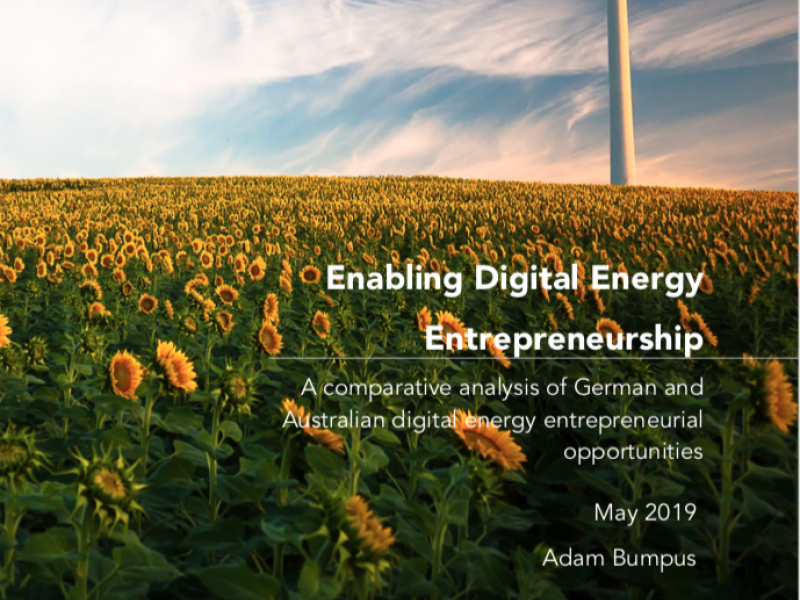Enabling digital energy entrepreneurship: a comparative analysis of German and Australian digital energy entrepreneurial opportunities

Emerging energy technologies and associated business models have the potential to concurrently reduce emissions plus support the development of strong economies. Entrepreneurs are using digital energy opportunities to explore alternative business models that promote the energy transition underway.
The problem
Entrepreneurship is challenging in the energy sector. It requires disrupting entrenched business models and powerful actors, while securing investment that spans the lifecycle of early-stage cleantech opportunities. This constant struggle faced by clean energy entrepreneurs delays the field from reaching its full potential. Both Australia and Germany are signatories to the 2015 Paris Agreement, which requires a commitment to self-determined greenhouse gas emissions reductions by 2030. Australia is not on track to meet its Paris commitments, and further reductions are achievable across sectors. Increased clean energy generation and efficiency measures would enable emissions reductions across many of these sectors.
Digital energy
As a digital approach to energy systems, digital energy facilitates the use of Internet of Things technologies, new energy data streams and the application of optimisation software to energy generation, storage, distribution and use. While this innovative approach to the energy system could provide significant opportunities for entrepreneurs, the technology is nascent and a delay in the deployment of digital infrastructure remains a key challenge. To overcome this issue, entrepreneurial ecosystems have an role to play in supporting new digital energy businesses. Ecosystems that foster discovery and commercialisation are essential to overcoming the challenges associated with energy entrepreneurship. Entrepreneurial ecosystems create favourable conditions that support partnerships, level the playing field, and increase understanding of clean energy entrepreneurship among the public and decision-makers. Accelerators, incubators, hackathons and bootcamps are examples of mechanisms to support energy entrepreneurship.
The Australian and German contexts
In recent years, both Australia and Germany have experienced robust growth in clean energy entrepreneurship. Although distinct, both national economies provide complementary conditions for energy entrepreneurs. In Australia, various factors, including an abundance of renewable energy resources, have created opportunities for clean energy entrepreneurship in spite of national policy uncertainty. In Germany, an enabling political environment has resulted in renewable energy opportunities that contribute to the national Energiewende (energy transition) strategy.
Isolated examples of specific government and corporate-sponsored innovation funds exist in Australia, but the German government appears to have an integrated, ‘whole of economy’ approach to innovation and entrepreneurship and is investing in region-based entrepreneurial programs. In the absence of strong Australian programs, incubators and accelerators play a critical role in Australian clean energy entrepreneurship.
Challenges for Australia and Germany
The energy transition is creating a new energy landscape characterised by decarbonisation, decentralisation and digitalisation. With the digital industry growing exponentially globally, digital energy entrepreneurship provides exciting possibilities for both Australia and Germany. However, there are constraints that must be addressed for upscaling and commercialisation to be realised.
In Australia, opportunities for digital energy are aided by regulatory changes for electricity markets and aggregated demand response capabilities. Specifically, digital energy technologies (also known as ‘Wave 2’ technologies) are well positioned to provide appropriate analytical and integration software to fundamental renewable energy technologies (i.e. hardware-based renewable energy generation technologies, also known as ‘Wave 1’ technologies). However, grasping these opportunities requires addressing constraints associated with deployment and commercialisation. Investment remains a fundamental challenge, particularly in the face of a volatile policy landscape. Public investment in clean energy innovation continues to flow from existing sources: the Australian Renewable Energy Agency and the Clean Energy Finance Corporation. Private investment is primarily provided by venture capital and corporate venture capital. Despite growing interest, there remains a dearth of capital for large, potentially transformative ideas.
In Germany, digitalisation of the energy system will be a fundamental component of the successful delivery of Energiewende. The German government recognises that increased investment in research and development is required for Germany to meet its digitisation potential, and has provided a stable regulatory policy environment for the development of well-integrated renewable energy generation. Digital business models are being enabled through market-based mechanisms, particularly in relation to smart metering (although the rollout of smart metering is progressing slowly). Both public and private sector investment show positive signs in supporting digital energy entrepreneurs. Digital deployment is being addressed nationally through a network of academic excellence centres. However, a concerted effort to engender changes in corporate culture is required to bolster progress.
Bumpus A (2019), Enabling Digital Energy Entrepreneurship, Energy Transitiion Hub, Melbourne.


